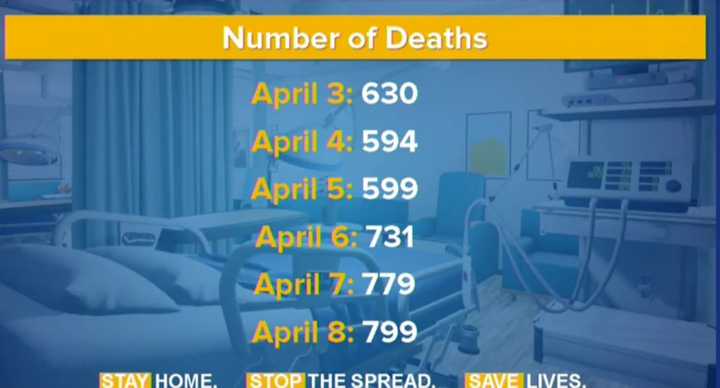The grim news came at the same time hospitalization rates continued to fall, the rate of ICU patients dropped to a new low, and an apparent "flattening of the curve" continued. (See third and fourth images above.)
At his daily COVID-19 news briefing on Thursday, April 9 in Albany, New York Gov. Andrew Cuomo announced there were 799 more deaths tied to the virus, bringing the statewide total to 7,067 since the outbreak began.
Comparatively, 2,753 lives were lost at the World Trade Center during the September 11, 2001 terror attack.
“9/11 was supposed to be the darkest day in New York for a generation, and since then, we’ve done everything we can to make sure something like that doesn’t happen again,” Cuomo said. “We’ve already lost more than 7,000 lives to this crisis. That is shocking and painful and breathtaking. There’s really no words for it.
“9/11 was so devastating, and so tragic, and now we’re losing so many more New Yorkers to this silent killer. There was no explosion, but it’s been a silent explosion that ripples its way through society. It has the same randomness and the same evil as we saw on 9/11.”
During his COVID-19 update, Cuomo went over several projection models they have studied, with an extreme of 136,000 cases in New York City alone, and as few as 73,000. When the outbreak began, New York had a 53,000 hospital bed system, which has been stretched to nearly 90,000.
“Any of these scenarios are devastating for New York. Any of these scenarios are problematic,” he said. “We’ve increased the capacity of the system dramatically, and so far our efforts are working better than anyone predicted they would work, because people are complying with the new normal. We can’t underestimate this virus.” ”
Cuomo noted that it’s been 18 days since he effectively shut down the state, it’s been 39 days since the first COVID-19 case in New York, and 80 days since the first case came to the country. Since those drastic measures, the governor said that they’ve noticed the “stay at home” order has been relatively effective in “flattening the curve,” in the number of cases and hospitalizations.
Only 200 new patients were hospitalized with COVID-19 overnight, down from a peak of more than approximately 1,300 daily earlier this month.
“Statisticians said that ‘we don’t know how effective it would be to close things down and social distance,’ because we’ve never done it before,” he said. “That’s the opportunity to flatten the curve, but you’ve got to get people to comply with the measures and we’ve never seen anything before like this in the country. They didn’t know if we could get them to comply.
“We should still be concerned. We can’t have people saying ‘well, we’re flattening the curve, now I can relax.’ No. You can’t relax, because the curve only flattened last night and that’s because of what we did yesterday, and the day before, and the day before that.”
Click here to follow Daily Voice Chappaqua and receive free news updates.




